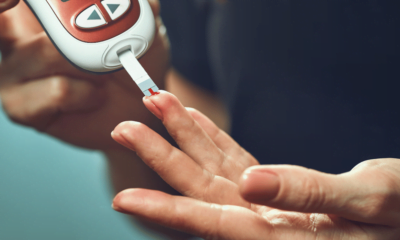Estimated reading time: 6 minutes
CBD isn’t a cure-all or a magic fix, but it might help make things a little more bearable if you’re struggling with anxiety right now.
If you are feeling anxious or on edge about everything going on in the world at the moment, you’re not alone.
CBD isn’t going to magically fix everything, and we’re not here to profess that it will, but it might be a helpful tool to have to hand when it all feels too much.
We’ve put together a definitive guide for anyone thinking about trying CBD to help with their anxiety.

What actually is anxiety?
Anxiety is one of the most common mental health conditions in the UK and it can have debilitating effects on a person’s daily life. It’s a natural reaction to stress that creates fear or an apprehensive feeling about what could go wrong. While anxiety can happen to everyone from time to time, some people struggle more than others.
There are many different forms of anxiety including generalised anxiety disorder (GAD), social anxiety disorder (SAD), panic attacks or post-traumatic stress disorder (PTSD).
Each form of anxiety may have different symptoms but the most common include restlessness, a feeling of dread, difficulty concentrating and irritability. When it comes to panic attacks, a person may feel a sudden increase in cortisol and epinephrine which cause a fight or flight response. PTSD may cause nightmares, flashbacks or feelings of isolation.
People struggling with anxiety may remove themselves from situations where they feel these emotions the most such as social situations or work. It may also cause physical feelings such as dizziness, fast or irregular heartbeat, dry mouth, shortness of breath, stomach aches or excessive sweating. All of which can be exhausting.
How does CBD work?
CBD is thought to interact with the receptors in the brain potentially sending signals to the neurotransmitter, serotonin. There is still a lot of research needed in this area to understand how the two interact.
Serotonin is the neurotransmitter responsible for your mental health and lower levels are sometimes associated with depression or anxiety. This is why the prescription treatment for anxiety is usually selective serotonin reuptake inhibitors (SSRI).
SAD
CBD may work differently for different types of anxiety. SAD is a social disorder where people can feel panic at the thought of social settings or speaking to groups of people.
A study on CBD for patients with SAD found that it may help to reduce symptoms. Participants in this study were given 400mg of CBD or a placebo before being given questionnaires and undergoing functional neuro-imaging to record the differences. The researchers reported that those in the group given the CBD recorded lower levels of anxiety.
Sleep
Anxiety can also often make it difficult for people to fall asleep, with CBD potentially improving sleep quality. Another study examined if CBD could help to improve sleep quality while reducing anxiety. The study involved 72 participants with 47 experiencing anxiety, of which a further 25 had poor quality sleep.
Each participant was given a daily dose of 25mg of CBD then asked to self-report how they felt afterwards. The researchers recorded that 79.2 per cent recorded reduced anxiety while 66.7 per cent said their sleep had improved after the first month.
PTSD
Post-traumatic stress disorder (PTSD) can develop after exposure to a traumatic event. This may be different for everyone but the journal, Frontiers in Neuroscience estimates that 10 per cent of the population will develop PTSD in their lifetime. The symptoms can be debilitating, affecting a person’s sleep, wellbeing and relationships.
Some studies show CBD may be effective if taken immediately after the person experiences trauma. It is thought that CBD may make it more difficult for the brain to form negative or frightening memories. The potential of CBD to help PTSD is why many veterans take CBD or cannabis to help their symptoms.
Panic attacks
Panic attacks can be another symptom of anxiety. They are a reaction by the body to extremely stressful situations or fear. They can cause a person to experience a racing heartbeat, feeling faint, increased sweating, nausea, ringing in the ears, dry mouth or numbness. Those experiencing panic attacks may avoid situations for fear it may trigger another attack.
There is a desperate need for more studies on humans who experience panic attacks as many existing studies are on animal subjects. One such study from 2012 measured the ‘fight or flight’ reaction of mice who were given CBD then exposed to predators. They reported that the CBD had a potentially anti-adverse effect where the mice were less inclined to attempt escaping.
The escape behaviour mirrored the symptoms of human panic attacks, which suggested that CBD may be helpful.
What is the best CBD for anxiety?
There isn’t one particular product that works on just anxiety. As each person is an individual, different factors may affect how CBD works such as height, weight or metabolism.
The different types of anxiety may mean different methods of CBD work better than others. If someone is experiencing a panic attack, they may prefer to have a faster acting way of absorbing CBD such as oils or vaping. If a person is using CBD for PTSD then they may prefer to take CBD at night to aid in falling asleep. Anxiety experienced throughout the day such as GAD may respond to continuous doses throughout the day. Patches may be a great option for someone who needs a steady amount.
It is worth doing your research when it comes to selecting what CBD you want to take, what brand to buy and when is the best time to take it. Some brands may offer CBD tailored for particular symptoms associated with anxiety conditions.
Terpenes are another consideration as they can offer an extra bit of anxiety relief. Terpenes are the compound found in plants that causes their smell such as limonene in citrus fruits. Some CBD brands have begun to add different terpenes to particular blends aimed at relaxation or sleep. The most notable would be linalool in lavender, pinene in pine needles and myrcene in hops.
After starting CBD for anxiety, you may notice increased effects over time. This is where the saying ‘start low, go slow’ comes from. If you start with a lower percentage, you can build up slowly over time. While some effects can be seen faster than others, CBD works best when it is taken consistently over longer periods of time.
One of the best ways to notice the difference in your anxiety is to record your CBD journey. This means noting down any decreases in your panic attacks, changes to your sleep pattern or even, increased feelings of calm or restfulness.
It can help you to identify when it’s time to change the brand, method or even increase the dose but more than anything, it can be reassuring to see the differences and know that it’s working.
Always talk to your GP before making any changes to your medical care.
If you have been affected by any of the issues raised in this article, support is always available. Contact Samaritans on 116 123, email jo@samaritans.org or visit www.samaritans.org
[activecampaign form=33]

 Science5 months ago
Science5 months ago
 Industry6 months ago
Industry6 months ago
 News5 months ago
News5 months ago
 News6 months ago
News6 months ago
 Health5 months ago
Health5 months ago
 Health3 months ago
Health3 months ago
 Science5 months ago
Science5 months ago
 Cannabis explained5 months ago
Cannabis explained5 months ago













